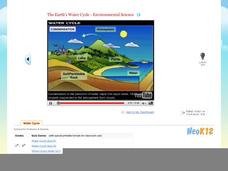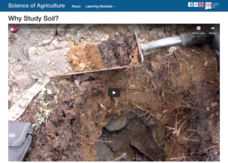Fuse School
Hard and Soft Water
What does it mean to have hard or soft water? Learners discover the chemistry behind water hardness in the fifth video of a seven-part series describing our water resources. Using simple animations and balanced chemical equations, young...
Fuse School
How Sewage Treatment Works - Water Treatment
To flush or not to flush ... that is the question. Is the wastewater treatment program in most towns and cities really the most efficient way to deal with waste? The fourth installment in a series of seven videos about the world's water...
Fuse School
Water Treatment - Water Works
With so much water everywhere, how is it that people around the world don't have clean water for drinking and bathing? Part three in a seven-part series describing Earth's water resources introduces the class to the process of water...
Fuse School
Water Cycle
Go with the flow! The first video of a seven-part series about the Earth's water resources introduces learners to the water cycle. With an emphasis on cause and effect, it presents the information simply through animation. And, with the...
Curated OER
The Earth's Water Cycle - Environmental Science
Although very short, this video imparts the basic information associated with the water cycle. It might be best-used as a refresher for the teacher to make sure he/she has the most important vocabulary words and their definitions down.
Bozeman Science
Environmental Matter Exchange
Why did carbon marry hydrogen? They bonded well from the minute they met. Here is a video that focuses on the essential chemicals for life: water, carbon, nitrogen, and phosphorus. It relates each of these to macromolecules and the way...
California Academy of Science
Waste Water Recycling
What types of water qualify for recycling and how does the recycling process work? The eighth lesson in the 10-part series exploring Fresh Solutions presents both the financial and water savings associated with emerging recycling methods.
Fuse School
Making Hard Water Soft
We need softened water to easily clean our homes, our clothes, and our bodies ... but how do you soften hard water? Part six of a 7-video series exploring the world's water resources and issues shows the two most common methods of...
California Academy of Science
Water-Wise Farms
The seventh lesson on Fresh Solutions in the 10-part series addresses solutions implemented on farms. It focuses on the options currently in use and hopes for the future of water conservation and farming.
Learning Games Lab
Why Study Soil?
Some scientists spend their entire careers analyzing and learning about soils. An interesting video lesson provides an overview of what soil scientists do and why. Pupils learn how soil analysis connects to other branches of science...
PBS
The Water Cycle: Ways of Watersheds | UNC-TV
Explore water on Earth without getting wet using a short animated activity. Scientists learn how water interacts with the land, the importance of watersheds, and relevant vocabulary as they watch an informative and engaging video....
MinuteEarth
Which Came First—the Rain or the Rainforest?
"Hahai no ka ua i ka ulula'au." In other words, "The rain follows after the forest," but is it actually true? The video discusses the development of the rain forests and their unique water cycle. It also offers advice on what...
Fuse School
What Is The Natural Greenhouse Effect?
The Greenhouse Effect is a big part of why Earth is able to sustain life. But, how much is too much? In part two of an eight-part series about the carbon cycle, environmental scholars learn how the natural Greenhouse Effect keeps us warm...
Fuse School
Quarrying - Economic, Environmental and Social Effects
Where does limestone actually come from? The sixth video in a seven-part series introduces pupils to the quandary of quarrying. The resource examines the positive economic factors involved in digging for limestone, as well as the...
TED-Ed
The Nurdles’ Quest for Ocean Domination
Nurdles aren't the cute characters of a new children's cartoon, they are the tiny plastic pellets slowly polluting the world's water supply. Learn all about these little trouble makers with this short video that explores the impacts...
Fuse School
Environmental Impacts of Detergents
Dangerous detergents? Who knew? Pupils learn of the darker side of laundry day as they complete the series of seven videos on water and the environment. The video shows common detergent ingredients, how these ingredients can harm the...
California Academy of Science
Desalination
Desalination requires around two gallons of sea water to make one gallon of fresh water—that's quite a ratio! Viewers consider the pros and cons of desalination as one option to providing fresh water. They learn about two different...
Bozeman Science
Biogeochemical Cycling
A woman had a job crushing cans at the recycling plant; it was soda pressing. Video focuses on the ways our environment recycles, including the water cycle, carbon cycle, nitrogen cycle, and the phosphorus cycle. It also describes the...
TED-Ed
What Is the Tragedy of the Commons?
What's good for all of us is good for each of us. The Tragedy of the Commons refers to a situation in which one person's decision to act in his or her own best interest negatively affects the rest of the population—and ultimately, him or...
Crash Course Kids
How to Get Resources - Picky Pineapples
How do we survive if the resources we need are not available? This is the focus of a video that explains how humans adapt and transform to get the resources they need. An investigation of how Las Vegas has adapted to using a...
Veritasium
Why Are 96,000,000 Black Balls on This Reservoir?
A Los Angeles reservoir is the largest ball pit on Earth. Learn the problem and solution of the water treatment plant in LA in a Veritasium video lesson. An unexpected chemical reaction created an issue in the treatment of water, and the...
PBS
Career Connections | Hydrologist
Love math, science, geography, geology, and most especially water? Consider a career as a hydrologist. The narrator of a short video introduces viewers to the many careers in the field of hydrology and the educational pathways available...
TED-Ed
Cloudy Climate Change: How Clouds Affect Earth's Temperature
While clouds may not make for the most enjoyable weather, they play an important role when it comes to regulating the temperature of the earth. Watch this video and learn how these giant masses of water droplets actually help to...
Curated OER
Earth : Climate Change & The Global Ocean
Changes to the earth's atmosphere can cause environmental change; they can also affect the ocean. Learn how satellite images show scientists what changes are occurring under the surface of the ocean. They can detect temperature shifts,...























